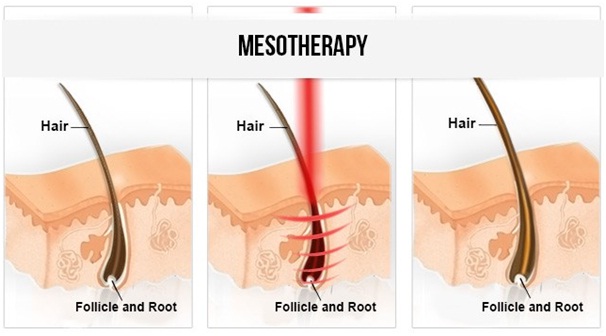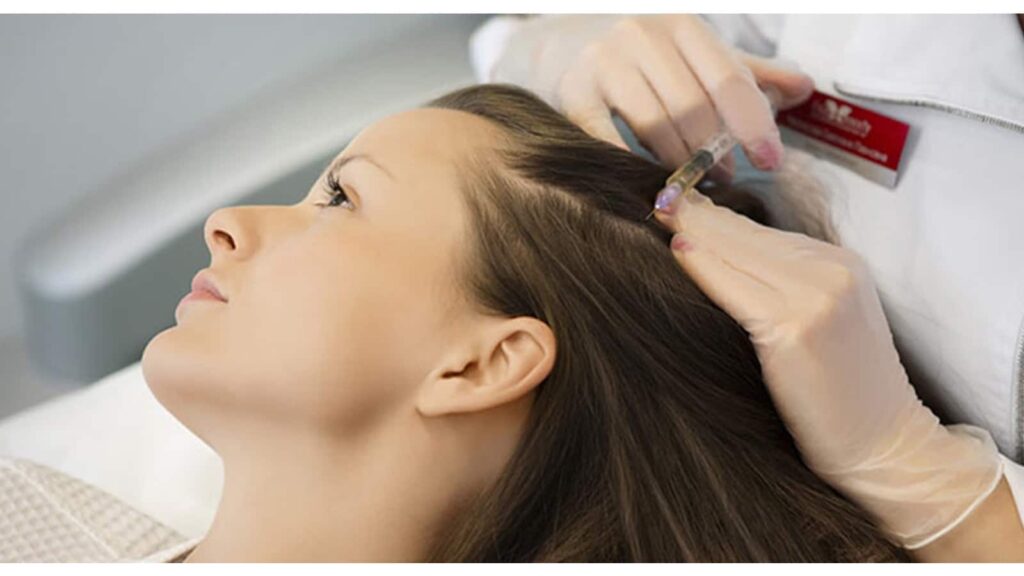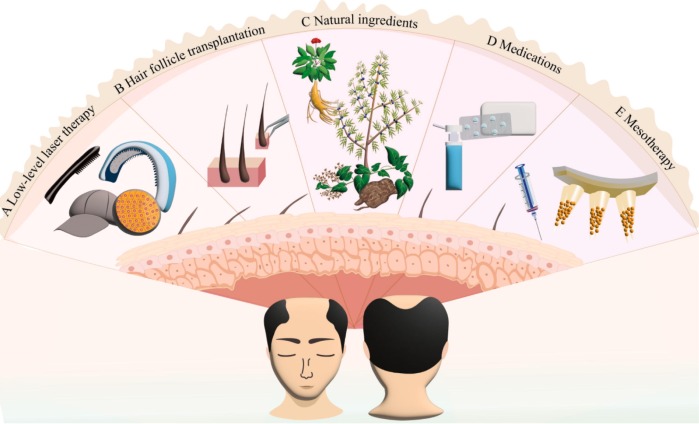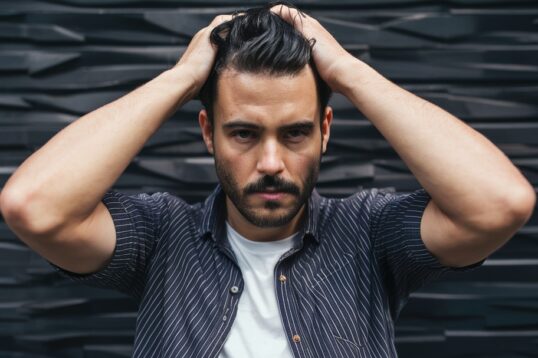The Pros of Mesotherapy for Hair Loss: An Intensive Treatment That Can Renew Your Scalp and Promote Hair Growth and Thickness. Learn more about this minimally invasive procedure.
The treatment known as Enter Mesotherapy is not just a set of injections, but it is about giving people confidence back in their lives.
Described as a scientific process, Mesotherapy guarantees to restore your scalp to its healthy state, a process of sprouting every hair. It is not just a procedure, it is a way of regaining the confidence which hair loss leaves one with.
Definition and history of Mesotherapy
In Mesotherapy, a solution containing vitamins, enzymes, hormones, and plant sections is injected into the skin. Dr. Michel Pistor, a French doctor, first used Mesotherapy in 1952 to treat pain and improve blood circulation. It has gradually found its way into cosmetic medicine, such as hair loss treatments.
Mesotherapy is believed to work for hair loss by providing concentrated nutrients directly to the hair follicle. This procedure is assumed to enhance circulation, reduce inflammation, and stimulate hair follicles to create more resilient hair strands.
The treatment desires to nourish and hydrate the scalp to arrest hair loss, enhance hair thickness, and promote the hydration of the scalp.
Although Mesotherapy is a well-liked treatment for hair loss, its efficacy varies from person to person, so it’s vital to speak with a healthcare provider before proceeding.
How Mesotherapy Works for Hair Loss
- Mechanism of Action: Mesotherapy injects a specific nutrient cocktail into the skin’s middle layer, the mesoderm, which is home to hair follicles. This direct method guarantees that the nutrients enter the hair follicles more effectively than oral or topical therapies—the tiny injections cause microscopic wounds on the scalp, triggering the body’s healing process. Increased blood flow, the synthesis of collagen, and the transport of growth elements necessary for good hair development are all parts of this reaction.
- Ingredients Used in Mesotherapy for Hair Loss
Depending on the patient’s demands and the practitioner’s experience, the precise combination of chemicals used in Mesotherapy may change. Typical components consist of:
Vitamins
Minerals
Amino Acids
Growth Factors
Coenzymes
Other Ingredients
How Mesotherapy Stimulates Hair Follicles and Promotes Growth

- Enhanced Blood Circulation: The micro-injuries caused by the injections and the nutrients delivered directly to the hair follicles improve blood flow to the scalp. Enhanced blood circulation ensures hair follicles receive a good supply of oxygen and nutrients for their health and growth.
- Nutrient Delivery: By injecting a concentrated mix of vitamins, minerals, and amino acids directly into the scalp, Mesotherapy ensures hair follicles receive the essential nutrients they need to function optimally. This targeted nutrient delivery helps to rejuvenate dormant hair follicles and promote new hair growth.
- Nutrient Delivery: By injecting a concentrated mix of vitamins, minerals, and amino acids directly into the scalp, Mesotherapy ensures hair follicles receive the essential nutrients they need to function optimally. This targeted nutrient delivery helps to rejuvenate dormant hair follicles and promote new hair growth.
- Stimulation of Collagen and Elastin Production: Micro-needling during Mesotherapy induces the presentation of collagen and elastin in the scalp. Collagen strengthens the hair structure, while elastin maintains the elasticity and health of the hair follicles.
- Reduction of DHT Levels: Some mesotherapy formulations include ingredients that inhibit the formation of dihydrotestosterone (DHT), a hormone that contributes to hair loss, especially in androgenetic alopecia. By reducing DHT levels, Mesotherapy helps to prevent further hair loss and promotes regrowth.
- Activation of Growth Factors: Growth factors in the mesotherapy cocktail stimulate hair follicle cells and prolong the hair cycle’s anagen (growth) phase. This leads to thicker, healthier hair and a reduction in hair shedding.
Through these mechanisms, Mesotherapy halts hair loss and revitalizes hair follicles, leading to thicker, stronger, and healthier hair growth.
The Mesotherapy Procedure

Mesotherapy is a minimally invasive technique that involves helping microinjections into the mesoderm, the middle layer of the skin. Although the method is somewhat simple, accuracy and knowledge are needed.
The Mesotherapy Procedure:
A consultation is first held to discuss the objectives and establish reasonable expectations for the course of treatment.
To reduce discomfort, the targeted area is cleaned and may be topically anesthetic-numbed.
A customized solution might include different ingredients and be made to meet the individual’s demands.
Using a tiny needle, the practitioner administers injections between one and four millimetres below the surface. A mechanical pistol that attaches to the needle can be used to quickly provide several injections, one after the other.
Usually, several sessions are needed, first scheduled seven to ten days apart. Sessions may be spread out to occur once every two weeks or once a month when progress is noted.
Substances Used in Mesotherapy and Their Roles:
Combining these substances is designed to rejuvenate and nourish the scalp, potentially leading to improved hair growth and reduced hair loss. It’s important to note that the specific formula used in Mesotherapy can vary greatly depending on the practitioner and the individual’s unique needs.
Always ensure a qualified healthcare professional performs the therapy to minimize risks and maximize possible benefits.
Benefits
Mesotherapy is increasingly recognized for its potential benefits in hair restoration. Here’s a summary of the key advantages it offers:
Apart from these advantages, Mesotherapy has the potential to progressively reestablish hormonal equilibrium, hence aiding in the consistent development of new hair.
Maintaining a healthy diet, practicing excellent sleep hygiene, and controlling stress can all improve hair health and increase the benefits of mesotherapy.
Side Effects
Common Side Effects
Mesotherapy is generally considered a safe method, but like any medical therapy, it can have side effects. The most typical side effects are typically mild and temporary, including:
These common side effects are usually manageable and do not require significant downtime.
Uncommon Issues
Although they are uncommon, the following possible side effects of mesotherapy exist:
These complications are uncommon, mainly when a skilled and experienced practitioner performs the procedure.
How to Minimize Risks
To minimize the risks associated with Mesotherapy, consider the following precautions:
Who is a Good Candidate for Mesotherapy?
Mesotherapy is a versatile treatment that caters to various cosmetic and medical concerns. Here’s a guide to understanding who might be a good candidate for this procedure:
- Ideal Candidates
- Conditions Suitable
- When to Consult a Doctor
It’s essential to have a detailed consultation with a qualified medical professional who can provide a personalized assessment and determine if Mesotherapy is the right option for you.
Inquire about any prerequisites for the treatment, such as avoiding sun exposure or blood thinners.
Mesotherapy vs. Other Hair Restoration Methods

Here’s a comparison Mesotherapy with other hair restoration methods, including PRP Therapy, Micro-needling, Laser Hair Therapy, Minoxidil, Finasteride, and Hair Transplants:
| Treatment | Mechanism | Pros | Cons | Why Choose Mesotherapy |
|---|---|---|---|---|
| Mesotherapy | Injections of nutrients, vitamins, and medications directly into the scalp | Non-surgical, customizable, no downtime | Results vary, multiple sessions needed, and less research-backed | For those seeking a non-invasive, nutrient-rich treatment with minimal downtime. |
| PRP Therapy | involves injecting platelet-rich plasma to stimulate hair growth | It is Non-surgical and uses the body’s healing factors | It requires Multiple sessions, and its effectiveness varies | It provides more growth factors and minerals. |
| Micro-needling | Stimulates healing by causing micro-injuries to the scalp | Can be combined with topical treatments; it promotes collagen production | It Can be painful and increases the risk of infection | It is less unpleasant and directly provides chemicals that promote growth. |
| Laser Hair Therapy | Low-level lasers to stimulate hair follicles | Non-invasive can be used at home | Mixed results, requires consistent use | gives hair follicles immediate nutrition. |
| Minoxidil | Topical application to stimulate hair growth | FDA-approved, easy to use | Must be used indefinitely, can cause scalp irritation | might provide more thorough scalp nutrition. |
| Finasteride | Oral medication that inhibits DHT | FDA-approved, clinically proven for male pattern baldness | Potential side effects, including sexual dysfunction | offers targeted treatment while avoiding systemic adverse effects. |
| Hair Transplants | Surgical relocation of hair follicles | Permanent results, natural-looking | Invasive, expensive, recovery time required | doesn’t require surgery or recuperation time. |
Because mesotherapy provides a personalized mixture of medicines to address hair loss at its root, it may be preferred over other options. It’s a flexible therapy that can be coupled with other therapies to improve outcomes and is customized to meet the needs of per patient.
Cost of Mesotherapy for Hair Loss
Cost range for mesotherapy treatments in both INR and USD,
| Aspect | Cost in India (INR) | Cost in the USA (USD) | Considerations |
|---|---|---|---|
| Single Session | RS 5,000 – RS 15,000 | $70 – $200 | Consult with a healthcare provider to ensure suitability. |
| Multiple Session | RS 20,000 – RS 60,000 | $280 – $800 | Consider the practitioner’s expertise and the clinic’s reputation. |
Before deciding on Mesotherapy, it’s essential to consider the total cost of treatment, which may include multiple sessions, and consult with a healthcare provider to determine if it’s the right option for you. The fees vary based on several factors.
Conclusion
Mesotherapy has emerged as a significant option in hair loss treatments, offering a blend of science and convenience. Its potential lies in its ability to deliver nutrients directly to the scalp, fostering an environment conducive to hair growth.
- Mesotherapy’s customizable approach allows treatments to be tailored to individual needs, potentially leading to better outcomes.
- As a non-invasive procedure, it offers an alternative for those hesitant about surgical options like hair transplants.
- It can be used with other treatments, potentially enhancing overall results.
- Always begin with a professional consultation to assess suitability and discuss expectations.
- Investigate the credentials and experience of the practitioner.
- Evaluate the expense in light of the anticipated gains and contrast it with other accessible therapies.
Mesotherapy could be a valuable addition to the arsenal against hair loss, particularly for those seeking a less invasive, customizable solution. However, as with any medical treatment, it is crucial to proceed with informed consent and under the guidance of qualified professionals.
FAQs
What is Mesotherapy for hair loss?
Mesotherapy for hair loss is a non-invasive procedure involving micro-injections of a customized blend of vitamins, minerals, and other nutrients into the scalp. This process stimulates hair follicles, promotes growth, and improves scalp health.
How does Mesotherapy work for hair loss?
The micro-injections deliver essential nutrients directly to the hair follicles, enhancing blood circulation and strengthening the follicles. This process promotes the growth of new hair, increases hair density, and improves the overall health of the scalp.
Is Mesotherapy painful?
Most patients experience minimal discomfort during Mesotherapy. A numbing cream is often applied to the scalp before the procedure to reduce pain. Patients may feel slight pressure or a tingling sensation during the injections.
How many mesotherapy sessions are needed for hair growth?
The degree of the patient’s hair loss and how well they react to treatment will decide how many sessions are needed. For best effects, 6–10 sessions spaced 1-2 weeks apart are usually advised. Every few months, maintenance sessions can be required.
Is it possible to combine mesotherapy with other hair restoration procedures?
Indeed, for better outcomes, mesotherapy can be used in conjunction with other procedures, including PRP therapy, micro needling, and laser hair therapy. Combining therapies can offer a more all-encompassing hair restoration strategy.
Does insurance cover mesotherapy?
Insurance does not usually pay for mesotherapy for hair loss because it is primarily regarded as cosmetic surgery. Some clinics, however, provide financing choices or payment plans to assist with cost management.
Are mesotherapy outcomes long-lasting?
Results from mesotherapy are not always permanent, but they can last a long time. Regular maintenance sessions could be necessary to keep them going. The underlying cause of hair loss, compliance with follow-up therapies, and lifestyle modifications affect how long the results last.

